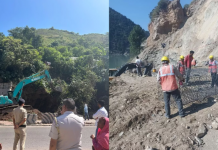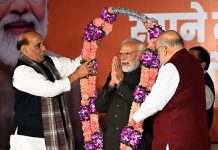 The problems and solutions of the distressed agrarian sector are not unknown to the experts, but given the stranglehold of the other two sectors of the economy — industry and services — and the apparent indifference and even reluctance of the government to tackle the issue head-on is resulting in a spate of farmers’ suicides and mounting agrarian distress.
The problems and solutions of the distressed agrarian sector are not unknown to the experts, but given the stranglehold of the other two sectors of the economy — industry and services — and the apparent indifference and even reluctance of the government to tackle the issue head-on is resulting in a spate of farmers’ suicides and mounting agrarian distress.
The number of suicides no longer shocks our country or countrymen and women, it has become mere statistics to be bandied about to score political points rather than to work out on a lasting solution for the agrarian crisis gripping the nation, whose majority of population still depends on farm sector and allied activities.
When I was given an opportunity to do a column, my theme and focus were clear — that I will concentrate on the aspects of rural life and affairs that have always fascinated me.
Especially, given the fact that the rural sector is largely unorganised and thus, has little or no clout in decision making or even lobbying, that the more articulate and persuasive bodies of industry, trade and service manage to do and get the government of the day to listen to them, which perhaps explains why the powers that be ignored requests Tamil Nadu farmers protesting in Delhi.
Only their daredevil antics and eye-ball grabbing activities like running naked on the street, eating dead rats and living with skulls (representing the countless farmers who have committed suicide) earned them some prime-time television appearances, but the government at the centre could care less. Neither the Prime Minister Narendra Modi met the protesting farmers, nor the Tamil Nadu politicians, instead got a junior minister to persuade the farmers to shift their agitation to Tamil Nadu. Tamil Nadu, perpetually short of water for drinking and irrigation, depends on neighbouring Karnataka and Andhra Pradesh to meet its water needs.
Whenever the monsoon is deficient, Karnataka refuses to release water due to Tamil Nadu, as per the Supreme Court order, and as a result, Cauvery delta basin-the rice bowl of south India, goes virtually dry.
The year 2011-18 is one such year and being an election year, politics for sure came in the way of implanting the Supreme Court order and release water to Tamil Nadu as per its quota in February 2018 SC order that settled the over 100-year-old dispute.
Ask the farmers across the country and they will tell you of their own tales of misery. Things were not all this bad before there was “development and growth”, but progressively farmers and farm sector got neglected over the years.
We all know there is much more to rural affairs than just agriculture and there are wide scope and opportunity for non-farm activities in the villages that many are doing. In fact, it is those farmers who have managed to latch on to some productive engagement survive and still swear by their farms in the hope of a better tomorrow.
Only, the political class must take a collective decision and take an oath to wage a war against the termites eating into the farm sector.
K Bhavani is a freelance writer based in Bangalore/ Chennai tracking social, economic and political developments for the past few years. She also takes interest in films and sports and is an avid cricket fan
letters@tehelka.com












